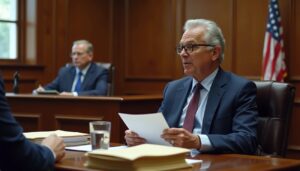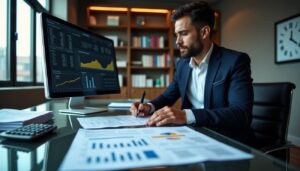Intellectual property (IP) is often a company’s most valuable asset, yet also the hardest to value. Patents, trademarks, copyrights, and trade secrets don’t appear neatly on a balance sheet, but they drive competitive advantage and long-term revenue. When these rights are infringed, the resulting economic damages can be substantial.
Determining those damages, however, is complex. Courts need clear, credible valuations, not guesswork. This is where an economic damages expert becomes essential. They quantify the financial harm caused by infringement, presenting damages models that withstand legal scrutiny and help judges and juries understand the stakes.
From lost profits to reasonable royalty calculations, an economic damages expert witness turns invisible assets into measurable financial evidence. Without this testimony, IP owners risk undervaluing their losses or failing to recover them at all.
The Nature of Intellectual Property in Litigation
Unlike physical assets, IP generates value indirectly. A patent may protect a manufacturing method that reduces costs. A trademark may anchor brand loyalty that translates into premium pricing. A copyright may fuel recurring revenue from licensing. These intangible contributions often exceed the value of tangible assets.
The Challenge in Court
Because IP doesn’t sit on balance sheets, damages are contested. Plaintiffs argue for maximum value, while defendants argue that infringement caused little harm. This gap makes the role of an economic damages expert witness critical. They provide the objective analysis courts rely on.
Types of Economic Damages in IP Cases
Different IP disputes require different valuation approaches. The goal of an economic damages expert is to isolate the financial harm caused by infringement and present it in a way that withstands scrutiny in court. Below are the primary categories of damages that commonly arise.
Lost Profits
Lost profits are often the most significant form of damages in IP litigation. Here, the economic damages expert must prove that the IP holder would have earned additional revenue if the infringement had not occurred.
This analysis involves more than a simple before-and-after comparison:
- Market share captured by the infringer – For example, if an infringer sold a patented product at a lower cost, the rightful owner may have lost customers who otherwise would have purchased the original.
- Sales the rightful owner lost – Experts quantify both direct lost sales and indirect losses, such as reduced follow-up purchases or service contracts.
- Additional costs incurred due to infringement – These include marketing campaigns launched to win back customers or legal fees tied to defending market
Courts often require experts to apply the Panduit test (proving demand, lack of alternatives, capacity to supply, and calculable profit loss) to ensure lost profit claims are well-founded.
Reasonable Royalties
When lost profits are difficult to prove, often in cases involving complex markets or early-stage products, courts may award “reasonable royalties.”
This approach asks: What would the parties have agreed to as a licensing fee if they had negotiated before infringement occurred?
An economic damages expert witness typically builds models using:
- Comparable licensing agreements – reviewing royalty rates from similar deals in the industry.
- Industry benchmarks – applying sector-specific norms, such as typical rates in software, pharma, or consumer goods.
- Negotiation dynamics – factoring in the bargaining power of each party, the exclusivity of the license, and the strategic importance of the IP.
Unlike lost profits, reasonable royalties don’t require direct evidence of diverted sales, but they must still be grounded in reliable data. Competitors who rely on broad averages often produce royalty estimates that courts dismiss as speculative.
Price Erosion and Market Impact
Price erosion occurs when infringement forces the rightful IP holder to lower prices to remain competitive. The harm here is not just about lost sales, but about reduced margins across the board.
For example, if a trademark infringement causes brand confusion, customers may expect lower prices from the original brand, undermining premium positioning. Similarly, if an infringing product enters the market at a discount, the IP holder may be forced to cut prices on all units sold, reducing overall profitability.
An economic damages expert quantifies these effects by modeling “but-for” scenarios—what prices would have remained without the infringement, and calculating the revenue and profit shortfall.
Corrective Costs
In many cases, infringement causes reputational or operational harm that requires corrective spending. These costs represent direct economic damages.
Examples include:
- Rebranding expenses – designing new packaging or logos when a trademark is
- New advertising campaigns – to clarify ownership of IP and restore consumer
- Market re-education – training distributors, retailers, or customers to differentiate the genuine product from infringing goods.
While these costs may seem secondary to lost profits or royalties, they can still amount to millions, especially in industries like pharmaceuticals, consumer goods, or technology, where brand reputation is critical.
The Role of Economic Damages Experts in IP Litigation
In intellectual property disputes, the law determines liability, but it is the numbers that often decide the outcome. Attorneys can argue intent and infringement, but only an economic damages expert can quantify how much harm was actually done. Their role extends beyond calculation. They must ensure financial evidence is persuasive, understandable, and defensible in court.
Translating Complex Analysis for Courts
Jurors and judges rarely have financial or economic training. Yet they must interpret models involving royalties, lost profits, and market projections that can stretch across decades. An economic damages expert witness bridges this divide by turning complex valuation models into narratives jurors can follow.
Instead of walking through dense spreadsheets, effective experts use clear language, visuals, and relatable analogies. For instance, rather than saying “royalty stacking diminished profit margins,” they might compare it to “paying multiple tolls on the same highway.” These explanations make technical points memorable and believable.
Competitors often lose credibility here by relying on jargon and overwhelming exhibits. By contrast, seasoned economic damages experts simplify without oversimplifying, making sure jurors not only hear the numbers but actually grasp their meaning.
Withstanding Cross-Examination
Once testimony is presented, the real test begins: cross-examination. Opposing counsel’s goal is to find cracks: unrealistic assumptions, weak data sources, or signs of bias. An economic damages expert witness must be prepared to defend every assumption, whether it’s the choice of discount rate or the selection of comparable royalty agreements.
Credibility under pressure is key. A witness who grows defensive or evasive risks having their entire model dismissed by jurors. Conversely, experts who remain calm, objective, and precise strengthen their testimony. They show jurors that the evidence isn’t just numbers. It’s a reliable reflection of financial reality.
The difference between weak and strong expert testimony often determines whether damages are awarded in the millions or dismissed entirely.
Key Valuation Approaches in IP Damages
Valuing intellectual property requires more than standard accounting formulas. Because intangible assets are unique and often context-specific, an economic damages expert must carefully select and defend the valuation method that best fits the facts of the case. Courts expect not just accurate calculations but also clear reasoning behind the choice of methodology.
The Income Approach
The income approach estimates the value of intellectual property by projecting the future cash flows it will generate and discounting those flows to their present value. This method is
commonly applied in patent and copyright cases, where a technology, process, or creative work directly produces revenue.
For example, if a patented pharmaceutical allows premium pricing for a drug, an economic damages expert witness may model the incremental profits the patent owner would have earned absent infringement. Key factors include market demand, competitive alternatives, production capacity, and expected useful life of the IP. Because the income approach relies on forecasts, it is particularly vulnerable to scrutiny. Experts must justify every assumption about growth rates, margins, and discount factors.
The Market Approach
The market approach bases value on what others in the industry have paid for similar rights. An economic damages expert compares licensing deals, royalty agreements, or settlement terms involving comparable intellectual property. This approach provides courts with
real-world benchmarks that reflect industry practice.
The challenge lies in finding true comparables. No two IP assets are identical, and context matters. A royalty rate in consumer electronics may not apply to medical devices, even if both involve patents. An experienced economic damages expert witness adjusts for differences in industry, exclusivity, and bargaining positions. Competitors who simply apply average royalty rates from databases risk presenting damages figures that appear convenient but lack credibility in court.
The Cost Approach
The cost approach measures how much it would take to recreate or replace the intellectual property. This method is less common in litigation but can be useful for early-stage technologies, trade secrets, or situations where market and income data are limited.
For instance, valuing proprietary software that has not yet generated significant revenue might involve calculating the cost of development, testing, and implementation. While the cost approach provides a baseline, it often understates the true value of IP because it ignores future earning potential. A skilled economic damages expert frames this method as a supporting tool rather than the sole measure of damages.
Why Expert Judgment Matters
No single valuation method applies universally. Courts expect experts to explain why a particular approach or combination of approaches is most appropriate. A skilled economic damages expert witness weighs the strengths and weaknesses of each method, tailors the analysis to the facts, and provides transparency about assumptions.
Competitors who apply formulas mechanically without adapting them to the case often see their valuations crumble under cross-examination. By contrast, experienced experts show how methodology, evidence, and context align to produce reliable and defensible damage calculations.
Why Courts Rely on Economic Damages Experts
Courts can’t rely on advocacy alone. They need independent testimony that turns abstract rights into measurable numbers.
Establishing Credibility with the Jury
Experts who appear biased or overly technical lose juror trust. Those who communicate with clarity and neutrality, like Mr. Friedman, ensure testimony is persuasive.
Shaping Settlements and Verdicts
Strong damages analysis not only influences trials but also drives settlement negotiations. Parties are more likely to settle when damages models are robust and defensible.
Conclusion: Making the Invisible Visible
Intellectual property disputes are high-stakes battles where intangible assets must be valued as if they were tangible. The challenge lies in proving that value convincingly in court.
Without expert guidance, plaintiffs risk leaving millions unrecovered, while defendants risk overpaying.
In Florida and beyond, businesses increasingly turn to seasoned professionals who combine forensic accounting with litigation expertise. Leaders like Mr. Joey Friedman highlight the importance of experts who balance technical precision with courtroom clarity.
Get an Economic Damages Consultation Today!
Turn uncertainty into clarity. At Joey Friedman CPA, PA, we specialize in complex litigation support, including intellectual property disputes. Our team provides precise, defensible damages analysis to help clients protect the value of their most important assets. Contact Joey Friedman CPA, PA today for expert economic damages analysis that stands up in court.





